In Search of the Trump-Osborn Voters
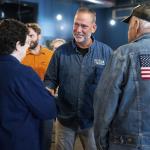
This story is part of the Prospect’s on-the-ground Election 2024 coverage. You can find all the other stories here.
NORFOLK, NEBRASKA – What should have been a sleepy Nebraska Senate race could now upend national politics. Two-term incumbent Deb Fischer has been caught flat-footed by populist independent and former union leader Dan Osborn, who is giving her the fight of her life in a state Donald Trump carried by nearly 20 points in 2020.
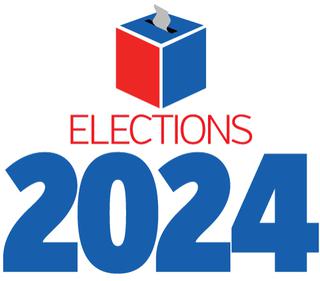
More than just control of the Senate—which professional handicappers rate as strongly tilting toward Republicans—is at stake. If he wins, Osborn’s unapologetic anti-corporate message would throw a wrench into the business-friendly approach of both parties. Republican incumbents in safe seats could be threatened by a formidable new type of opponent. It also risks embarrassing national Democrats if a firebrand steamfitter from Omaha is able to accomplish in the heartland what many middle-of-the-road Democratic standard-bearers could not.
As Osborn put it at a recent meet-and-greet in Ashland, “Imagine the ramifications on American politics if Nebraska sends an independent mechanic to the halls of power … Nurses, teachers, plumbers, bus drivers—they can all know they can do the same thing.”
Nebraska’s unique political institutions and history have greased the wheels for a competitive race that, while revelatory in its execution, appears somewhat obvious in hindsight. The nominally nonpartisan unicameral legislature has primed residents to vote for candidates without a Republican ballot line to guide them. Those races typically feature two conservative-leaning nominees trading barbs over whether the other is a closet liberal, making the messaging from Fischer and Republican-aligned groups painting Osborn as a wolf in sheep’s clothing less effective than practically anywhere else in the country. And the state’s cherished (but presumed dead) prairie populist traditions have been activated by a candidate who condemns corruption, unchecked corporate power, and career politicians.
But despite those unique factors and a spate of polling showing a dead heat, national observers have been slow to acknowledge the strength of Osborn’s candidacy, having been burned by recent independent Senate candidates like Alaska’s Al Gross and Kansas’s Greg Orman, who ultimately suffered lopsided defeats once Republican money came pouring in. I myself, a born-and-raised Nebraskan, was skeptical until just a few months ago, when the signs that Osborn’s message had tapped into something different started becoming undeniable.
If he wins, Osborn’s unapologetic anti-corporate message would throw a wrench into the business-friendly approach of both parties.
Several excited phone calls from my mother, an independent-minded registered Republican who splits her ticket in a manner that makes pollsters sweat, went unheeded over the summer. Only when my father, a lifelong Republican who I have often butted heads with on politics, issued his public endorsement of Osborn via Facebook two weeks ago did the reality sink in.
In the cadence common among right-leaning antiestablishment voters, sandwiched between memes about hunting, motorcycles, and the failures of the Biden-Harris administration, my dad wrote, “Deb Fischer will tell any lie she can find! I helped Deb get elected. I donated, I put out signs, etc. I’m voting for Dan Osborn!” Even more surprising, several of the likes and positive comments were from family friends who I could not have previously imagined voting for anyone without an R next to their name.
Still, my parents are odd ducks in Nebraska. Despite being registered Republicans, they have voiced a disdain for party politics my whole life. If Osborn carves a path to victory, he needs to make inroads with loyal Republican voters in a year where Trump sits at the top of the ballot. So I trekked back to my hometown of Norfolk and set off across the state over the last week to see if Osborn-mania was real. In the process, I interviewed over 30 Nebraskans for this story.
I STARTED MY JOURNEY AT THE WESTERN EDGE of Lincoln, where an Osborn meet-and-greet drew around a hundred people last Sunday evening. On the way into the city, I saw a number of Osborn yard signs in unexpected places, including alongside signs for conservative candidates and ballot referendum positions. In one grassy patch outside Reg’s 7 Mile Steakhouse near Columbus, I saw a massive sign featuring Osborn—who supports reinstating abortion protections once guaranteed by Roe v. Wade—a few yards away from what appeared to be a custom-printed sign urging Nebraskans to vote against ballot question 439, which would guarantee the right to abortion up until the point of fetal viability. When I asked the attendant about the sign, he demurred on the apparent contradiction, saying only that “there are lots of interesting views about the guy.”
When I rolled into the Big Red Keno where the Osborn campaign was hosting the meet-and-greet, the room was packed to the brim, with an overflowing crowd huddled around the door. I had already heard his stump speech, which consists of fiery rhetoric about supporting unions, reinvigorating antitrust laws, cutting wasteful spending (particularly in the Department of Defense), and protecting public benefits. “I don’t feel like there’s anybody like me in the United States Senate … Less than 2 percent of our elected officials come from the working class. I get frustrated with the corporate agendas. I have a worker agenda,” he said the last time I heard him. So I held back and took the temperature of the crowd.
I staked out a table near the bar and ordered some nachos while waiting for Osborn to take questions. At the table next to me was an older couple who resembled my parents. I asked about the “Osborn for Senate” sign lying across their table. They initially declined to speak, but one of the pair, a longtime union railroader by the name of Brent Meyers, loosened up a bit when I said I hailed from Norfolk, and noted a resemblance. After comparing family trees and deciding we may in fact share an ancestor a few generations back, he opened up to me about their politics.
He noted they were both Democrats who came to size up Osborn. For them, most of the excitement was not about his challenge to Fischer, but his staunch pro-worker and anti-corruption rhetoric. “He’s a working man like myself,” Meyers told me. “Nebraska is a traditionally Republican state. I’m a rarity. Even in a union shop, most of us are Republicans.” When asked if his Republican colleagues would follow suit, he felt confident many of them would.
The 7 percent of Nebraskan workers in a union will no doubt help Osborn on his path to a majority, but they lack the numbers to make the difference by themselves. So after scarfing down a few more nachos, I dove into the crowd to see who else Osborn was attracting.
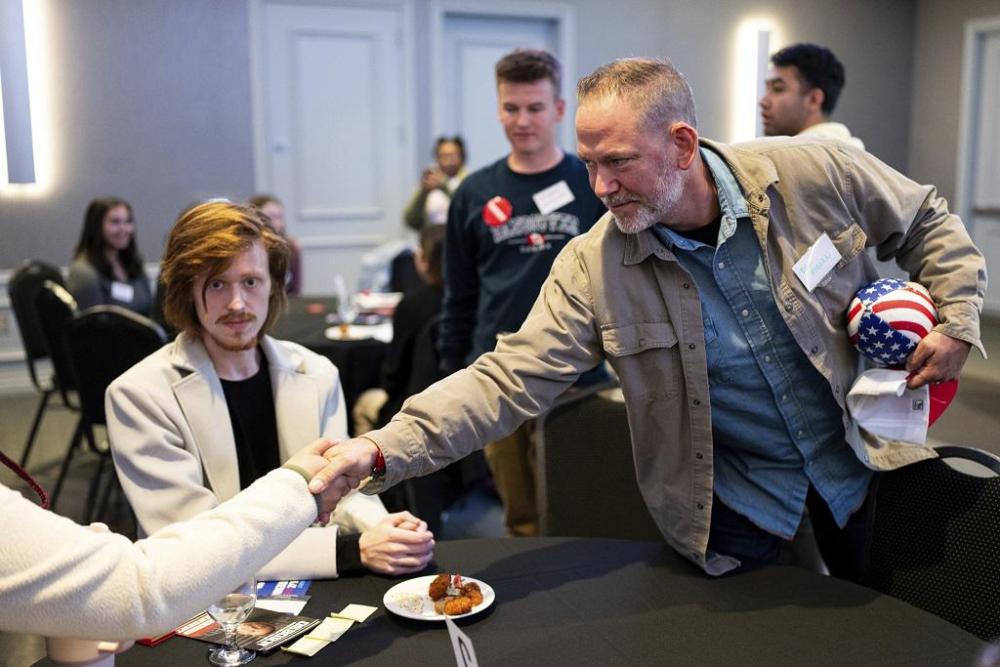
Dan Osborn shakes hands with students during a candidate forum at the University of Nebraska Omaha, October 15, 2024. Bill Clark/CQ Roll Call via AP Images.
After several polite rejections—Nebraskans are notoriously private and suspicious of media—I spoke with Erica Birky Rios, a Lincoln resident who had her college-aged son in tow. Erica was a Democrat who frequently volunteered for party candidates. Rios also attended my alma mater Macalester College—a quintessential hippie-dippie liberal arts school chock-full of normie liberals. For a second, it seemed to me that Osborn’s candidacy was doomed; nobody wins statewide in Nebraska on the backs of liberals alone.
But she tempered my skepticism slightly when she started talking about the way Nebraska Democrats view the race. “I think there is some mixed views across the party,” Rios explained. “Sometimes he comes across fairly conservative.” Still, she seemed confident he would consolidate Democratic voters, albeit begrudgingly, because of his self-described libertarian stances on abortion and minority rights. Rios opined that Democratic volunteers may not be showing up in droves at events or putting up yard signs, but were on board for his independent candidacy. It sounded to me that if there was a sweet spot, Osborn had found it.
As the crowd dwindled, I approached a few other people who looked the part of the Trump-Osborn voter—a quality that is much harder to gauge in a place like Nebraska. After being brushed off a few more times, I spoke with a registered nonpartisan sporting the most impressive set of muttonchops I have ever seen. He introduced himself as Connor Mullins. He declined to talk about the presidential race, but was excited to explain how Osborn represented the middle of the country in a way most centrist politicians do not. “When people calculate the median American voter, they seem to think they want fiscal conservatism and social liberalism,” Mullins lamented. “But most people around here want social moderation and economic populism, in my experience.” An on-the-nose observation that sounded like it could have been ripped straight out of the pages of this magazine.
Mullins and I discussed the bygone era of prairie populism a bit longer before I caught Osborn himself. He eyed me with the familiar suspicion most Nebraskans display toward a journalist, and when another attendee asked me to snap a picture of the two of them together, he used the opportunity to dip out of the event.
I drove back to Norfolk unsure what, if anything, the night said about the state of the race. Osborn needs Trump voters to be victorious. If there were any to be found that night, I had missed them.
THAT CHANGED THE NEXT EVENING, at another Osborn meet-and-greet event in the small exurb of Ashland, a rapidly growing Republican-leaning city situated right smack in the middle of the 60 miles of I-80 that separates Omaha and Lincoln.
Osborn’s campaign announced to the crowd of about 50 that he would be late due to the heavy rain pelting the area that evening. When he finally showed, in between his tough rhetoric about taking on big corporations and breaking the two-party system, he called out a couple members of the crowd by name, familiar faces from his time leading the union at the Kellogg’s factory in Omaha, which mounted a successful strike three years ago.
I caught up with those attendees, Joe and Sherri Hallett, after the speech. I was surprised to learn they were the exact kind of union Republicans Brent Meyers had told me about the night before. They remembered Osborn from their days at the plant, and had driven down to Ashland to see if he was speaking the same way campaigning for Senate as he did running the union. They seemed satisfied he was. Joe and Sherri explained that they worked alongside Osborn at the Kellogg’s factory but retired when COVID swept the country in the spring of 2020, a year before the strike that put Osborn on Nebraskans’ radar for the first time. (Kellogg’s later fired Osborn, who now works as a union steamfitter at the Boys Town facility in Omaha.)
After explaining that both she and her husband had voted for Trump twice and planned to do so again—and had supported Fischer in her previous races—Sherri said they were firmly on Osborn’s side in the upcoming election, and that several other Republican union members were leaning the same way. “Dan represents everything we work so hard for,” Sherri told me.
Sherri pulled Osborn out of another conversation he was engaged in and introduced him to me. I explained that we had already met, and asked Osborn if he had time for a few questions. I got a pointed no, but yelled out a few anyway as he headed for the door. While he waved off most, my query about the uncertain future of current Federal Trade Commission chair and aggressive corporate antagonist Lina Khan in a potential Harris administration caught his ear. “I’m no political analyst,” he told me, “but Lina Khan is doing good work, and we need more people like her in government.” (Osborn’s campaign later agreed to review a list of emailed questions for this article, but did not respond by the time of publication.)
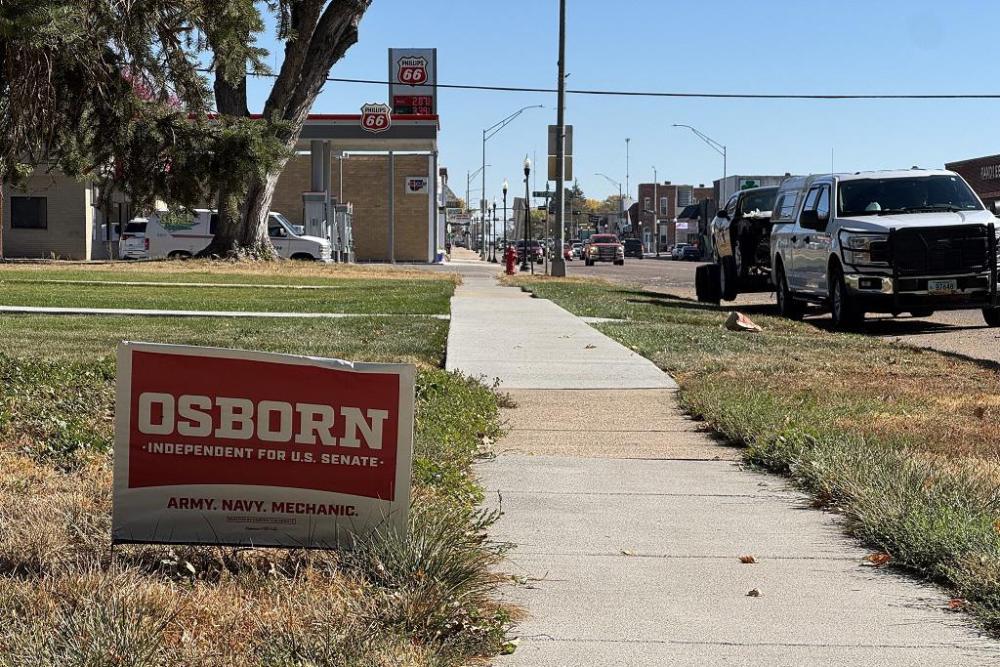
Austin Ahlman
While driving back to Norfolk and mulling over whether there were enough Republican voters like the Halletts to seal the deal for Osborn, I stopped at a Casey’s General Store in the small town of West Point to fill up my tank. Casey’s are a common stop across the heartland, and dot the landscape around virtually all of the small and midsized Nebraska towns essential to Osborn’s insurgent candidacy.
I exchanged a few pleasantries with a man named Dan who was hauling a load of produce. He initially dismissed political questions on the grounds that he “doesn’t care and thinks they’re all corrupt,” but he opened up a bit after I played the Nebraskan native card and learned he had grown up on a farm just outside Norfolk. Dan agreed to let me record an interview so long as I refrained from using his last name, refrained from noting his current employer, and refrained from specifying which type of produce lay in the back of his truck—that’s a Nebraskan for you.
Dan said he was a registered nonpartisan who was largely disengaged from politics. But Deb Fischer, in his view, was everything he had said was wrong with the system. “It bothers me how much her bank value has gone up. I mean, really, she should be wearing stickers just like in that ad,” he said, referring to the viral Osborn campaign ad that compared Fischer’s history of corporate contributions to patches on a NASCAR jacket.
“I’ve got an Osborn sign in my truck right now,” he boasted. When I asked him about the flood of Republican-funded attack ads calling Dan Osborn a closet Democrat, he waved them away. “Don’t believe everything you hear!”
AS I DROVE THE LAST 45 MINUTES HOME, my mind stuck on the math behind the Senate race. Just under half of Nebraska’s registered voters are Republicans, compared to just over a quarter registered Democrats. The remaining quarter are registered nonpartisan and third-party voters. While I felt pretty confident that Osborn was successfully consolidating the latter groups, the thin slice of union Republicans I believed might cross over did not strike me as quite enough for Osborn to win.
It was too late in the evening to score any more interviews in public spaces, so I whipped out my phone and called up my aunt on my mom’s side, who I see once every few years. She happily agreed to chat about the race, and I pulled up to her drive just after ten o’clock. What I expected to be a short conversation—my aunt and uncle are both unapologetic Trump voters who share few of my political views—ended up being a deeply revealing two-hour talk about what it was like trying to make it as a member of the working class and how those struggles have informed their politics.
My aunt is the quintessential Obama-Trump voter who switched her voting habits in the 2010s and never looked back. My uncle is a strong conservative. If either of them had voted for a Democrat in the last decade, I had not caught wind of it. But my aunt was adamant that she was voting for Osborn, which shocked me. Even more shocking was what closed the deal.
“What 100 percent made me say, ‘Yeah, I’m voting for Dan Osborn,’ was that commercial I saw the other day where Trump is endorsing Deb Fischer,” she explained, referencing a somewhat stilted video Trump cut aboard his private jet the prior week encouraging Nebraskans not to vote for Osborn. (Trump noticeably says nothing about Fischer in the ad.) “I am voting for Trump,” she emphasized, “but that commercial completely turned me off. It made me want to vote for Dan Osborn because of how it looked like a very forced advertisement.”
When asked whether anything Deb Fischer or her allies were saying on television or in mailers was changing their views, they both said firmly no. “Deb Fischer hasn’t given me anything. Period,” my aunt said, before my uncle jumped in to suggest that “she has become all about herself, and it’s just getting worse. It’s a politician thing.”
I asked if they found the ads accusing Osborn of being a Democrat in disguise convincing. They were similarly dismissive. Unlike other candidates who have tried their hand at dislodging red-state Republican incumbents in recent years, Osborn has never been registered as a Democrat or formally associated with the Democratic Party. And in Nebraska, voter registration histories are public, a fact my aunt was quick to point out. “They’re thinking that by saying those things, that Republicans aren’t even going to attempt to do research,” she bristled. “All I would say is, do your f***ing research.”
After a little prodding, my uncle, a lifelong mechanic who emphasized the importance of Osborn’s focus on right-to-repair reforms, disclosed that he too was leaning heavily toward splitting his ticket: Trump and Osborn. “I’m voting for Trump because I believe he’s the better choice for president,” he explained. “He’s not a politician, he was a businessman. Is he a great person? No, I don’t believe so, don’t get me wrong.” As for Osborn? “Osborn is a working guy,” he said matter-of-factly. I left around midnight, thinking for the first time that Osborn really was on track to win.
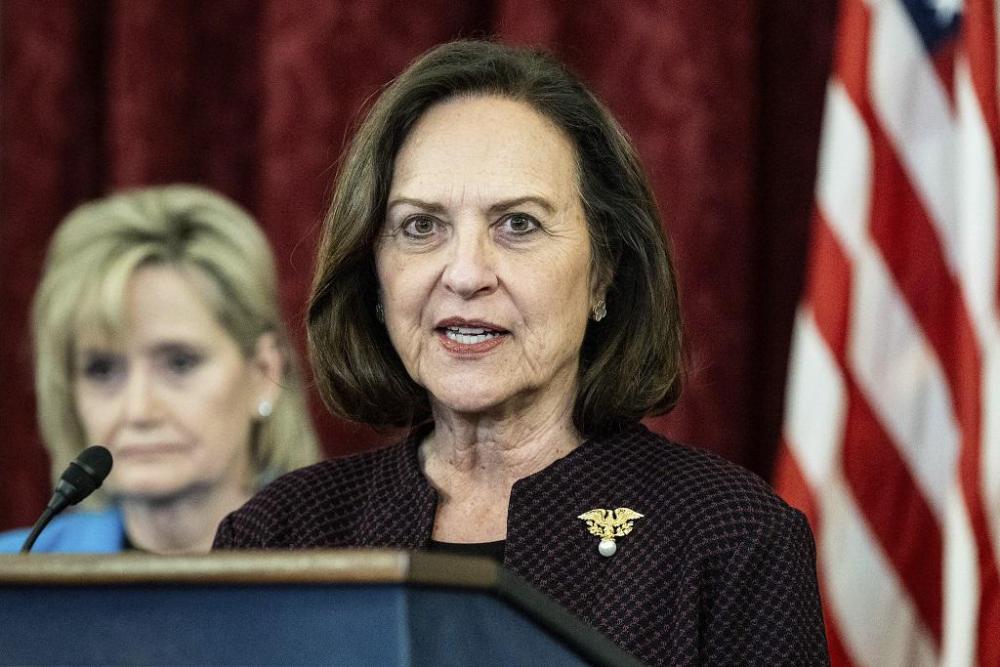
Sen. Deb Fischer (R-NE) speaking at the U.S. Capitol last year. Michael Brochstein/Sipa USA via AP Images
I GOT SOMETHING OF A REALITY CHECK the next day. I woke up early to drive out to Deb Fischer’s base in Cherry County. Fischer started her career in politics as a school board member and state senator representing the area, one of the most rural parts of the state. (Representatives for the Fischer campaign did not respond to multiple requests to comment on this story or provide information about public events in the race’s closing weeks.)
Media skepticism gets deeper the further west you go in Nebraska, and despite wearing a pair of bibs and driving a rusted old Dodge pickup my dad loaned me for the trip, I struck out the first five or six times I asked for an interview along my ride. Instead, I focused on the steady stream of radio ads, about half of which seemed to be focused on the Osborn-Fischer race. I noted one strange phenomenon though. The further west I went, the fewer signs I saw—for either candidate. It struck me as odd to be in Fischer’s district of origin without seeing more than one, especially when signs for what I assume was a hotly contested state unicameral race were peppered across the sandhills.
I finally caught a break at a Speedee Mart in Ainsworth, where a pastor who asked to go by Wayne agreed to talk with me so long as I did not disclose his real name or the denomination of his flock. We started talking about how Osborn’s messaging was resonating in that part of the state. He admitted to having few insights into whether other Republicans were persuaded, but he was not. In his view, Osborn’s rhetoric about big corporations and the wealthy sounded more like “whining” than a message that reflected how most ordinary Nebraskans feel. He acknowledged that Osborn’s hits on Fischer for not holding public events across Nebraska were true, but said that his parents were union members who had a hard time getting by, and he was driving an SUV with almost 300,000 miles on it. If he was not complaining, then why was Osborn?
I thanked him for his time and drove on toward Valentine, a town of just over 2,000 people that serves as the major population hub for the hundreds of miles of ranchland that surrounds it. (It’s also where Tim Walz was raised.) While grabbing a drink at the Peppermill Restaurant & Lounge, I managed a brief exchange with a woman who would only agree to be interviewed if I promised to identify her solely as a “Cherry County rancher.”
She provided the first strong defense of Deb Fischer I had heard all week, noting that Fischer was an incumbent who had done a great job for ranchers, and encouraging me to “follow the money.” This was a reference to the air support Osborn has received from the Sixteen Thirty Fund, largely bankrolled by donors like Pierre Omidyar and George Soros. While the two are primarily Democratic donors, they have also contributed to nonpartisan think tanks with conservative and liberal leadership that advocate for increased union power and support breaking up and limiting the power of large corporations. Examples include American Compass and my full-time employer, Open Markets Institute.
The Cherry County rancher acknowledged that she had not seen much of Deb Fischer in recent years, but insisted that does not matter and would not affect her support.
At yet another Speedee Mart, I talked to the sole Osborn voter of the day, a former nurse and registered nonpartisan in her seventies who asked to go by the name of Ellen. She told me that if there were others like her, I was not likely to find them around here. I asked about the lack of yard signs for either candidate, considering this is what should be Fischer’s base of support. She explained that support for Republicans was assumed a given, and if you did support an independent (let alone a Democrat), you keep quiet about it for fear it could hurt your standing in the community or, in her case, the prospects of the business she operated. “It’s not tolerated, to put out street signs,” she said. “I’m afraid to.”
Before making the long drive back, I decided to try my luck one more time outside the Valentine Public Library. After getting brushed off a few more times, I struck up a conversation with another nurse, a young mom named Danielle. After hearing I was out to report on the Senate race, she told me very flatly, “We support Deb Fischer out here.” When nudged to explain what that meant, she told me that Fischer “represents the Republican Party well.”
I asked about the perception that Fischer did not have a presence in the state, and whether that had contributed to her vulnerability this year. “You know, I’ve never seen her out here. So yes, I would agree sometimes people get a little frustrated with that,” she conceded. “But, I mean, how much can you cover when you’re in politics?” She said that she receives pro-Fischer and anti-Osborn mailers practically every day. It struck me as odd that Republicans would dedicate that much money to pummeling voters in Fischer’s backyard, in a county where Republicans regularly win upwards of 80 percent of the vote.
I made my way back to my hometown not knowing what to make of my experience. While I had quite literally seen few signs of enthusiasm for Fischer, I had little to show for my hunt for Trump-Osborn voters in the reddest part of the state.
DURING MY FOUR DAYS CANVASSING THE STATE, the already saturated airwaves on cable news and radio only seemed to get worse. One late $3.5 million ad buy from the national Republican Senate Leadership Fund cemented what my own conversations had led me to believe: The race is a toss-up.
Osborn has released a steady stream of polls over the last few months demonstrating a tied race or narrow lead. Fischer, on the other hand, has released just two, the most recent showing her leading by mid-single digits and struggling to crack 50 percent—a stunning admission for a two-term Republican incumbent in a state as red as Nebraska. The only high-quality independent polling, which was commissioned by Split Ticket back in August, indicates it has been neck and neck for months. In what I can only assume is a conscious decision to avoid egg on their faces, public pollsters have avoided the race even in its closing weeks, meaning we are all flying blind.
The odds are no doubt stacked against Osborn. Even losing by single digits would be an accomplishment in its own right in Nebraska. But my discussions with everyday Nebraskans demonstrate that a path exists if he can consolidate the state’s nonpartisan, Democratic, and third-party voters, while targeting the roughly 5 percent of Republicans in union households and the oft-discussed Obama-Trump voters. Every person I spoke to who falls into those latter two categories told me they plan to vote for Osborn.
If Osborn does make it into the Senate, these voters’ comments indicate he is coming with a mandate to radically transform politics as we know it. That should scare the establishment classes of both parties.
Austin Ahlman is a reporter and researcher with the Open Markets Institute’s Center for Journalism & Liberty, where he writes about the intersection of corporate power, public policy, and politics.
The American Prospect is devoted to promoting informed discussion on public policy from a progressive perspective. In print and online, the Prospect brings a narrative, journalistic approach to complex issues, addressing the policy alternatives and the politics necessary to create good legislation. We help to dispel myths, challenge conventional wisdom, and expand the dialogue.
Founded by Robert Kuttner, Paul Starr, and Robert Reich, read the original 1989 prospectus for the magazine.
To learn more about our history, check out this 2015 piece by Starr and Kuttner, reflecting on 25 years of politics and change.
American Prospect, Inc., is a 501(c)(3) nonprofit corporation headquartered in Washington, D.C.
You can support our mission with a subscription or a tax-deductible donation.
